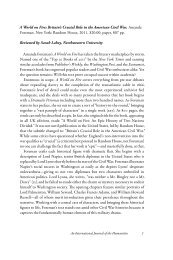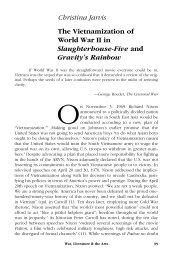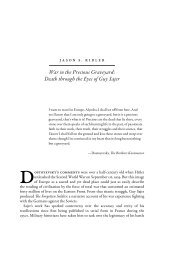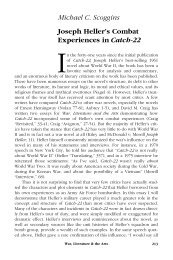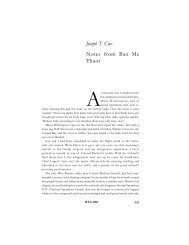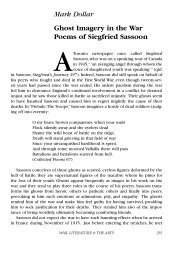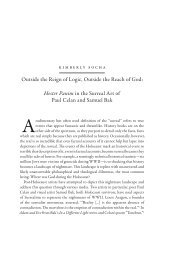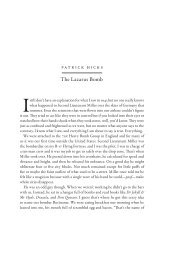Conrad's “The Secret Sharer”: A Private Ethics of Leadership
Conrad's “The Secret Sharer”: A Private Ethics of Leadership
Conrad's “The Secret Sharer”: A Private Ethics of Leadership
You also want an ePaper? Increase the reach of your titles
YUMPU automatically turns print PDFs into web optimized ePapers that Google loves.
authority in the cultural context where it is exercised. These embodiments are<br />
<strong>of</strong>ten, perhaps always, expressed as personal characteristics. To put it differently,<br />
a leader’s ability to recognize the authoritative characteristics in his or her own<br />
makeup and to translate these into a public identity permits the values to become<br />
shared–so that the experience <strong>of</strong> charisma for both leaders and followers is one <strong>of</strong><br />
sharing. 1 This is the most important social function <strong>of</strong> leadership and it can be used<br />
primarily for purposes <strong>of</strong> charity and social justice or for purposes <strong>of</strong> national and<br />
personal aggrandizement. For better or worse, charisma is a social phenomenon, an<br />
experience <strong>of</strong> sharing. Having acknowledged this broad function <strong>of</strong> leadership, I<br />
now want to leave the larger social sphere and move inward, into the inner dynamic<br />
<strong>of</strong> those who exercise practical authority.<br />
Everyone in a position <strong>of</strong> responsibility knows from experience that the exercise<br />
<strong>of</strong> practical authority involves trade<strong>of</strong>fs and conflicts between the pr<strong>of</strong>essional<br />
(public) and the personal (private) life. From a psychological standpoint the<br />
question quickly resolves itself into one <strong>of</strong> inner conflict, the tension or stress caused<br />
by the starvation <strong>of</strong> the personal self in the interest <strong>of</strong> social responsibility, whether<br />
that responsibility is characterized as religious, or social, or political, or military,<br />
or commercial, or corporate, or even familial. The representation <strong>of</strong> this conflict<br />
is a central concern <strong>of</strong> our greatest literature. Antigone in her long final speech<br />
recalls her thwarted desire to become a wife and mother; Brutus acknowledges his<br />
inner war between “genius” and “mortal instrument”; Milton’s Adam learns what<br />
it means to fail to govern where one adores; Dr. Frankenstein withdraws in the face<br />
<strong>of</strong> pr<strong>of</strong>essional disillusionment; Captain Vere feels paternal love for the person his<br />
conception <strong>of</strong> duty requires him to kill. And in the end these characters do not do<br />
well as leaders precisely because they have not resolved the conflict between their<br />
public and private identities, their pr<strong>of</strong>essional functions and their personal needs.<br />
We might admire them (Antigone); we might pity them (Vere); we might identify<br />
with them (Adam)–but they do not serve us as models <strong>of</strong> sustainable leadership.<br />
For that we need to go to those who, however ethically imperfect, have achieved<br />
this inner resolution, like Shakespeare’s Henry V, like Stendhal’s Napoleon, like<br />
Winston Churchill, like Martin Luther King. And more important than a list <strong>of</strong><br />
successful leaders (over which we might well disagree) will be an understanding <strong>of</strong><br />
the process <strong>of</strong> resolution itself, its costs and its returns.<br />
Achieving the Resolution: <strong>“The</strong> <strong>Secret</strong> <strong>Sharer”</strong><br />
In order to discuss this complex matter clearly and efficiently we need a narrative<br />
that deals with the internal conflict between personal and pr<strong>of</strong>essional authority<br />
x War, Literature & the Arts



